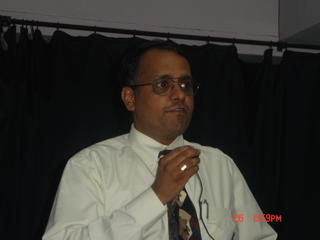
Highlights of the monthly HRI Meeting organized by the Bangalore Chapter of HRinIndia
Topic - Managing Knowledge Workers - Some Thoughts by Krishna Setlur, Head HR Samsung Software Development Centre India
The meeting with a welcome speech by Raghav Chief Editor HRudaya. He invited Mr. Gopalakrishna Gubbi, Manager of Mistral Software to introduce the speaker to the audience. Gopal in his inimitable style introduced Krishna.
At the outset Mr. Krishna has told the audience that this presentation of his is Inspired by a report by Mr.Bryan, LL & Joyce, C- “The 21st Century Organization”- The McKinsey Quarterly- 2005:03
The presentation begain with Defining Knowledge Worker -
First Coined by Perter Drucker in the 1950’s – a ‘new’ class of employee
Basic means of production is the ‘productive’ use of ‘knowledge’
Dominates the workforce more than ever in the 21st century
Essentially holds knowledge as a primary skill – professionals
Then he extolled on the basic charecteristics of Knowledge Workers are those who -
Give a competitive edge to the enterprise…
Are independent- cannot be ‘commoditised’ (unlike the practice applied to industrial shop-floor workers)…
Often self-directed and self-motivated…
output is tangible, but the process of value creation is itself not so visible…
Create and enhance knowledge thru collaboration with their professional peers…
So collaboration, and knowledge sharing is a key to their productivity
Then Krishna explained the Problems being faced by current organization structures…
Organisation structures- legacy of the Industrial Revolution
Vertically / functionally organised
With a complicated attempt to adapt to the Knowledge Revolution
Matrix organisation overlaid on the vertical structures - just confuses, and complicates
These are ill suited for the Knowledge economy of the 21st century
With this structure, it is a struggle to find the appropriate information even within organisational boundaries – tremendous productivity loss
Struggle to find the right info., and time wasted in searching for it, if at all found !
We need more efficient paradigms of organising our enterprises for this century.
So is such a paradigm possible
New Age Organisational Design is based on on four inter-related principles:
1. Stream-line and re-focus current vertical structures
2. Off-line teams with mandate to look at long-term opportunities
3. Develop Knowledge Marketplaces, Talent Marketplaces, and FORMAL Networks to stimulate the creation and exchange of intangibles
4. Rely on measurements of performance rather than supervision to enhance productivity.
These four principles are most effective when applied together in a holistic manner
Else, the potential benefits of this approach are stunted.
Principle -1: Streamline and refocus
Get a clear and dominant criteria for organizing e.g.: Functional, Geographical, Product category, etc.
Define clear-cut accountabilities and decision making for these structures
Set focussed immediate term objectives
Do not muddle them with non-core activity
Common support functions can be run like utilities- by professionals who know these areas rather than by these line managers – who are at best gifted amateurs.
Principle-2: Off-line teams
Identify the areas for long-term focus
Get appropriate well-structured teams (Sometimes cross functional) organised for these areas
Clear mandate and goals
But enough freedom to ‘wander around’ with ideas and access information
Principle-3: Marketplaces and Networks
Facilitates cross organisational interaction
Key element of these knowledge and talent market places
Economic value within organisation (bring the market place from outside to inside)
Easy to exchange
Motivates the creation and offer of such intangibles
Principle- 4: Measurements
Motivate thru clear cut measures of value rather than blind supervision
Brings transparency – very valuable for self directed professionals
Fosters healthy competition among the teams
Krishna explained the Practical Implications as that in a knowledge economy of professionals – the role of a ‘line’ manager is nothing but facilitating high productivity amongst these knowledge workers
So this Century really belongs to the HR professionals – who are the ‘facilitators’ of these ‘facilitators’ – HR is a meta-facilitator.
Pre-requisites for HR Effectiveness
- Understand the business
- Can you have an intelligent conversation with the average employee about his work -content (not just the process)
- The basic metrics of your biz (e.g. no. of projects, your top 10 customers, revenue, profits, etc.)
- What is your CEO’s/ biz/ Leaders’ wish list.
It is very important to understand what makes your biz tick…
What are the key vale additions in ur enterprise -what do customers pay ur biz for-
E.g. low cost, premium branding, niche product/ services, etc.
Which groups of employees then are the key contributors to this value-add?
Manage your area of influence…
Once you understand your Biz, your Biz. Leaders will be willing to listen- talk their language
Then you can influence the structure and strategy
But even before that look at the incremental initiatives in this direction
Examples of Markets…
Project Learning Papers
Internal Seminars
White papers…
Can start with notional ‘value tokens’ – then maybe more amenable to real money
Examples of Markets…
Talent Markets
Internal Job Postings
Attract the best talent to the better projects
Create healthy competition for talent
Knowledge workers can ‘change jobs’ in the same organisation
Succession Planning and Career Pathing
Make it a competitive exercise of compulsory rotation – but with multiple options for the employee.
This wonderful presentation was followed by interactive Q n A sessions where audience posed many queries which was deftly answered by Krishna.
HRI Bangalore Chapter thanks all the members who have come to the meeting and wish their continued patronage for all the future meetings. The next meeting will be held on the last Tuesday of August which happens to be 30th. The speaker and venue will be announced later.
